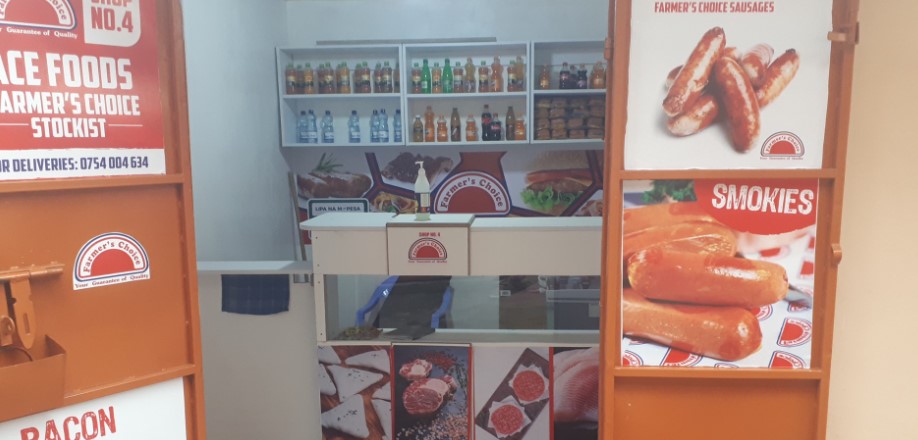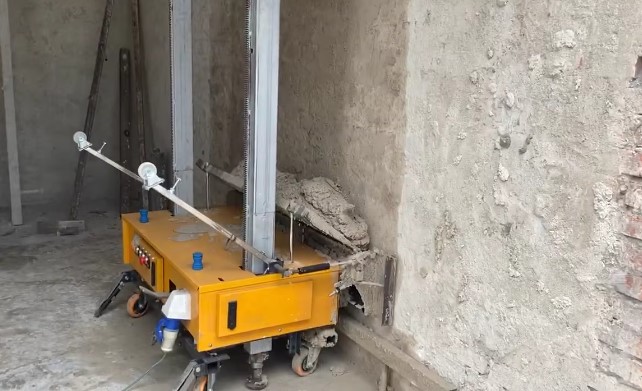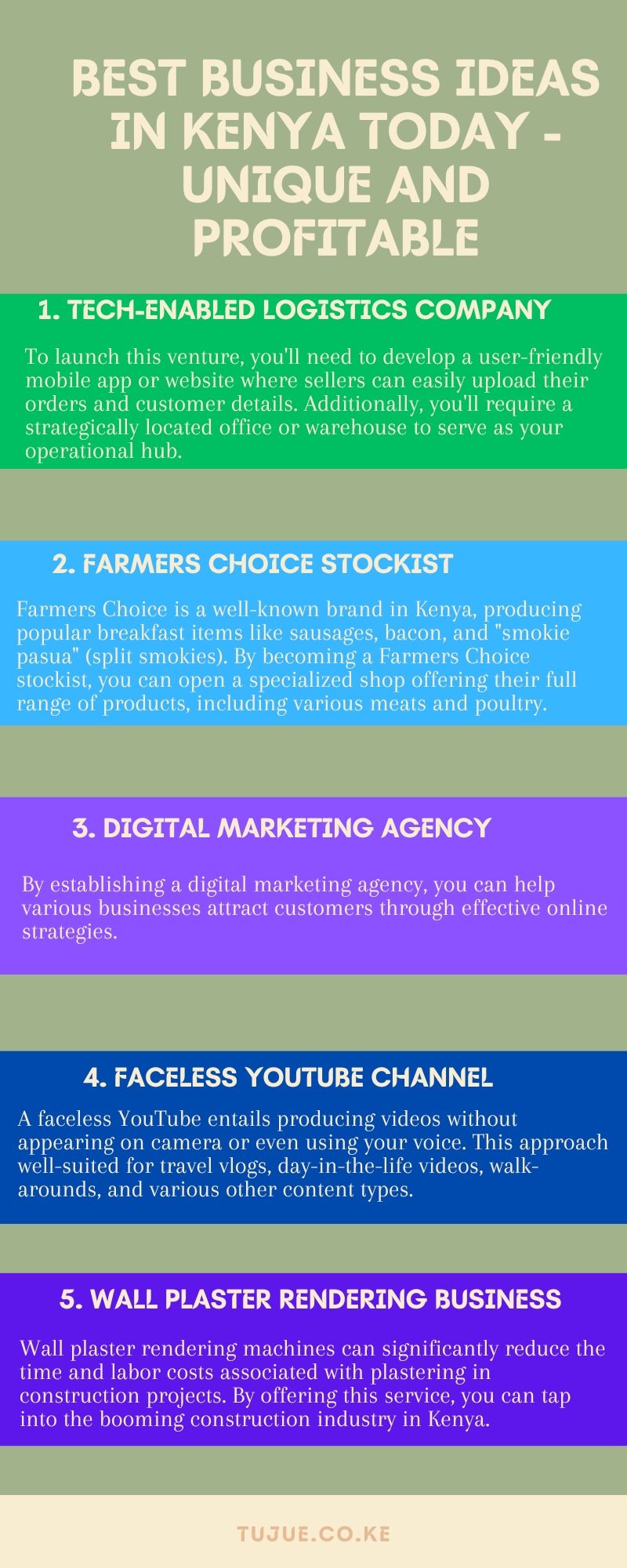Whether as a side hustle to supplement your income or as your primary source of livelihood, the entrepreneurial spirit is alive and well in Kenya.
However, the age-old question remains: Which business venture should I pursue? What are some of the best business ideas in Kenya today? These simple questions often leads to confusing considerations.
The gap between theory and practice can be substantial, which is why careful consideration and research are crucial before embarking on any business venture.
Also Read:
How to Make Money Online in Kenya
Top 6 Unique and Profitable Businesses in Kenya
In this comprehensive guide, we’ll look at six fast-growing businesses in Kenya. These are innovative and profitable business ideas for the Kenyan market that are not likely to fail.
We’ll look at the requirements, including financial investments, and discuss strategies for monetizing these ventures effectively.
1. Tech-Enabled Logistics Company

With the rapid growth of e-commerce in Nairobi and across Kenya, there’s an increasing demand for reliable logistics solutions.
Online businesses face two primary challenges: efficient product delivery and building trust with customers who are hesitant to pay before receiving their goods. A tech-enabled logistics company can address both of these issues simultaneously.
To launch this venture, you’ll need to develop a user-friendly mobile app or website where sellers can easily upload their orders and customer details. Additionally, you’ll require a strategically located office or warehouse to serve as your operational hub.
To streamline the process, consider offering storage solutions for traders, allowing for immediate order fulfillment and faster delivery times.
Rather than handling deliveries in-house, partner with established courier services like G4S, Fargo Courier, or Nation Courier. G4S, for instance, offers a convenient cash-on-delivery option, which can help alleviate customer concerns about prepayment.
Cost of Investment
Initial Investment:
Approximately 1-1.5 million Kenyan Shillings
Key Expenses:
– App/Website development (allocate a significant portion of your budget here)
– Office/warehouse rental in a central location
– Initial marketing and branding efforts
Revenue Streams
1. Apply a small markup on delivery costs
2. Charge a slightly higher fee for processing cash-on-delivery payments
3. Offer affordable monthly storage fees for small-scale traders
Note: To succeed, focus on processing a high volume of orders daily. Invest in aggressive social media marketing to attract customers, and prioritize exceptional customer service to ensure retention and word-of-mouth referrals.
2. Farmers Choice Stockist

Farmers Choice is a well-known brand in Kenya, producing popular breakfast items like sausages, bacon, and “smokie pasua” (split smokies). By becoming a Farmers Choice stockist, you can open a specialized shop offering their full range of products, including various meats and poultry.
The advantage of being a stockist lies in your ability to offer these products at more competitive prices than supermarkets, making your shop an attractive option for cost-conscious consumers.
Initial Investment
Approximately 600,000 Kenyan Shillings
Key Expenses
– Shop rental in a high-traffic area
– Two freezers for product storage
– Initial stock investment (around 300,000 KSH, as required by Farmers Choice)
– Business licenses and food handling certificates
– Miscellaneous expenses (e.g., shop fittings, initial marketing)
Revenue Strategies
1. Focus on high-volume sales to maximize profits
2. Establish relationships with local hotels, smokie vendors, and mini-marts for consistent bulk orders
3. Offer a delivery service for added convenience and to expand your customer base
Note: When choosing your shop location, prioritize areas with high foot traffic. Farmers Choice will assist with some branding and marketing efforts, which can help attract initial customers. To boost sales, consider implementing a delivery service where customers can place orders via phone or WhatsApp.
3. Digital Marketing Agency

In today’s digital age, businesses across all sectors need an online presence to thrive. By establishing a digital marketing agency, you can help various businesses attract customers through effective online strategies.
To get started, invest in comprehensive digital marketing courses. While there are free resources available on platforms like YouTube, paid courses on sites like Udemy often provide more in-depth and structured learning experiences.
Initial Investment
3,000 to 5,000 Kenyan Shillings for a quality online course
Additional Costs
– Computer or laptop (if you don’t already own one)
– Reliable internet connection
– Basic software subscriptions (e.g., Canva for design, Hootsuite for social media management)
Revenue Streams
1. Offer digital marketing services to businesses on a project basis
2. Develop monthly retainer packages for ongoing marketing support
3. Create and sell your own digital marketing courses once you’ve gained experience and expertise
Note: To succeed in this field, stay updated on the latest digital marketing trends and algorithms. Network actively with local businesses and showcase your skills through case studies and testimonials. As you build your reputation, consider specializing in specific industries or marketing channels to differentiate your agency from competitors.
4. Faceless YouTube Channel

A faceless YouTube channel is an innovative content creation strategy where you produce videos without appearing on camera or even using your voice.
This approach is particularly well-suited for travel vlogs, day-in-the-life videos, walk-arounds, and various other content types. The possibilities are virtually endless, allowing for creative freedom while maintaining personal privacy.
Initial Investment
130,000 to 500,000+ Kenyan Shillings
Key Expenses:
– High-quality recording device (80,000 to 200,000+ KSH for a good smartphone or camera)
– Laptop for video editing (50,000 to 200,000+ KSH, depending on new or second-hand)
– Premium video editing software subscription (varies, but budget for annual costs)
– Optional: Stabilization equipment like gimbals or tripods
Revenue Streams
1. YouTube AdSense revenue from video advertisements
2. Brand sponsorships and product placements (often more lucrative than ad revenue)
3. Merchandise sales (e.g., t-shirts, mugs, or niche products related to your content)
4. Affiliate marketing through product recommendations
Note: To succeed with a faceless YouTube channel, focus on building a strong brand identity and growing a substantial following. Consistency in posting schedule, content quality, and niche focus are crucial. Engage with your audience through comments and community posts to foster loyalty despite the lack of personal appearance.
5. Non-woven Bags Production and Customization

Following Kenya’s 2017 ban on plastic bags, the non-woven bag industry has seen significant growth. There’s a particular opportunity in customizing these bags for businesses looking to stand out and promote their brand.
Initial Investment
2,300,000 to 3,500,000 Kenyan Shillings
Key Expenses
– Production and printing machine (1,800,000 to 2,500,000 KSH)
– Business registration and licensing fees
– Factory or workshop space (500,000 to 1,000,000 KSH for setup and initial rent)
– Raw materials for initial production run
Revenue Streams
1. Bulk production of standard non-woven bags for wholesalers
2. Customized bags for businesses with logos and branding
3. Specialized designs for events, conferences, or promotional campaigns
4. Eco-friendly alternatives to traditional gift wrapping for retailers
Note: To maximize profits, focus on building relationships with businesses across various sectors. Offer design services to help clients create impactful branding on their bags. Consider developing a range of stock designs that can be quickly customized for smaller orders or businesses with limited budgets.
6. Wall Plaster Rendering Business

Wall plaster rendering machines can significantly reduce the time and labor costs associated with plastering in construction projects. By offering this service, you can tap into the booming construction industry in Kenya.
Initial Investment
250,000 to 500,000 Kenyan Shillings
Key Expenses:
– Wall plaster rendering machine (150,000 to 250,000 KSH, including shipping)
– Vehicle for transportation (if not already owned)
– Initial marketing and networking costs
– Training for machine operation and maintenance
Revenue Strategies
1. Lease the machine to construction companies or individual builders on a daily or weekly basis
2. Offer a full-service option where you provide both the machine and trained operators
3. Partner with architects and interior designers to be their go-to plastering solution
4. Provide training services for construction teams looking to adopt this technology
Note: To maximize earnings, schedule multiple jobs per day, taking advantage of the machine’s efficiency. Develop relationships with construction companies and real estate developers for consistent work. Consider expanding your fleet as demand grows, allowing you to serve multiple sites simultaneously.

Best Business Ideas in Kenya Today Infographic
Good Luck Doing Business!
As you can see, it’s clear that opportunities abound for enterprising individuals willing to think creatively and work diligently. The key to success in any of these endeavors lies not just in the initial idea, but in the execution. As you consider which path might be right for you, remember these crucial points:
1. Research thoroughly: Understand your chosen market inside and out before investing.
2. Start small and scale smartly: Many of these ideas allow for gradual growth as you learn and adapt.
3. Prioritize customer service: In a competitive market, exceptional service can set you apart.
4. Embrace technology: Whether it’s for marketing, operations, or the core of your business model, technology can give you a significant edge.
5. Network continuously: Build relationships within your industry and with potential clients.
6. Stay flexible: Be prepared to pivot or adjust your strategies as market conditions change.
Remember, success in business is rarely overnight. It requires patience, persistence, and a willingness to learn from both successes and setbacks. The ideas presented here are just starting points – your unique perspective and approach can transform them into thriving enterprises.
The future is bright for those willing to take that first step – so why not make it yours?

